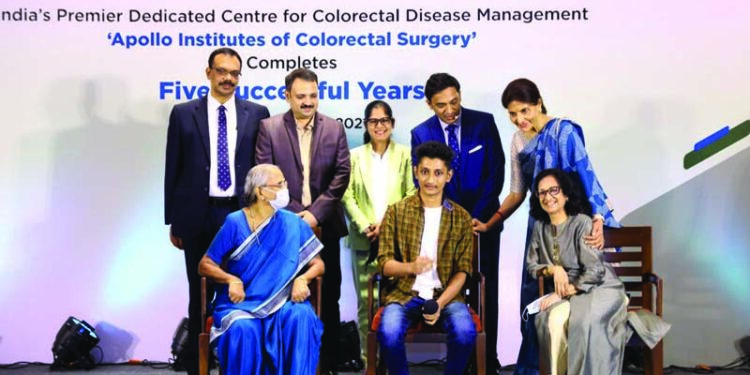R ARIVANANTHAM
CHENNAI, SEP 24
Dr. JD (name changed), a 28-years-old post-graduate medical student who had successfully undergone Robotic Colorectal surgery for low rectal cancer, went on to complete her medical post-graduation and won a Gold Medal. The occasion also marked the completion of five years since the Apollo Institute of Colorectal Surgery began offering cutting-edge minimally invasive robotic surgical techniques and technology in the treatment of patients with colorectal diseases, especially colorectal cancer, say senior officials of the hospital.
Addressing a media conference on Thursday, Dr. Venkatesh Munikrishnan, Consultant Colorectal & Robotic Surgeon, The Apollo Institute of Colorectal Surgery, Chennai said, “Dr. JD was diagnosed with very low rectal cancer in 2017 when she was 24, just as she was about to join her medical post-graduation. It was a shock to her as she expected that even with treatment, her medical dreams would come to an abrupt halt. This is because conventional surgery for colorectal cancer leaves patients with a colostomy, i.e., a surgically created opening in the body that routes bowel waste away into an external colostomy bag. It was then that she approached us with the hope that we could offer her a solution that would let her continue her studies and live a normal life. We did not let her down!”
“With Robotic Colorectal Surgery, we were able to perform the complex surgery to remove the cancer and reconstruct the colon to rectal/anal connection, thus avoiding a permanent colostomy. She had an uneventful recovery, went on to finish her course and excelled, getting the gold medal. The use of robotic surgery also has several short term benefits such as less blood loss, quicker recovery, and better maintenance of normal bodily function,” said Dr. Munikrishnan, giving details of the robotic procedure.
The rate of colorectal cancer has been increasing among young adults in their 20s to 40s over the last two decades. This is an age when people are active, building families and careers and it is important to ensure quality of life for these patients after treatment. However, colorectal cancer if identified in the early stages can be completely cured and Robotic Colorectal Surgery helps patients avoid colostomy and lead a normal life.
In his congratulatory message screened at the media conference, Dr. Prathap C Reddy, Chairman, Apollo Hospitals Group said, “In 2016, we started a specialised department for Colorectal Surgery and also simultaneously started Robotic Colorectal Surgery. This has led to precision surgery that causes minimal side-effects in patients. The Robotic Colorectal surgery program will also be extended to other hospitals in the group. We are confident that along with early diagnosis, this will help in making a significant impact in reducing the morbidity and mortality from colorectal diseases including colorectal cancer.”
Preetha Reddy, Executive Vice Chairperson, Apollo Hospitals Group said, “The development of the Apollo Institute of Colorectal Surgery as the only focused super-speciality centre for robotic colorectal surgery in India, is emblematic of our resolute commitment to clinical excellence. In our determination to provide the best available care in the world to patients, Apollo forged clinical collaborations with University College, London and Cleveland Clinic, Florida, USA. Such partnerships ensure that our medical teams are always updated on the contemporary medical developments and alongside, there is a healthy exchange of clinical expertise.”
Colorectal cancer is a common cancer globally but has a low reported incidence in India with GLOBOCAN 2018 ranking colon cancer 13th in terms of incidence and mortality with 27,605 new cases and 19,548 deaths annually. Since 2018, 27,605 new cases have been registered across India and the total number of patients living with the disease in India is estimated to be around 53,700. Colorectal cancer is on the rise especially among young Asian males with unhealthy lifestyle patterns one of the key reasons for its occurrence, said Dr Munikrishnan.










